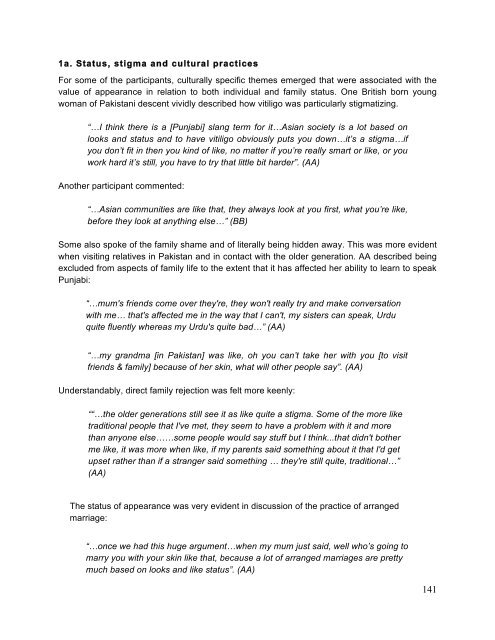Download the report - The Healing Foundation
Download the report - The Healing Foundation
Download the report - The Healing Foundation
Create successful ePaper yourself
Turn your PDF publications into a flip-book with our unique Google optimized e-Paper software.
1a. Status, stigma and cultural practices<br />
For some of <strong>the</strong> participants, culturally specific <strong>the</strong>mes emerged that were associated with <strong>the</strong><br />
value of appearance in relation to both individual and family status. One British born young<br />
woman of Pakistani descent vividly described how vitiligo was particularly stigmatizing.<br />
“…I think <strong>the</strong>re is a [Punjabi] slang term for it…Asian society is a lot based on<br />
looks and status and to have vitiligo obviously puts you down…it’s a stigma…if<br />
you don’t fit in <strong>the</strong>n you kind of like, no matter if you’re really smart or like, or you<br />
work hard it’s still, you have to try that little bit harder”. (AA)<br />
Ano<strong>the</strong>r participant commented:<br />
“…Asian communities are like that, <strong>the</strong>y always look at you first, what you’re like,<br />
before <strong>the</strong>y look at anything else…” (BB)<br />
Some also spoke of <strong>the</strong> family shame and of literally being hidden away. This was more evident<br />
when visiting relatives in Pakistan and in contact with <strong>the</strong> older generation. AA described being<br />
excluded from aspects of family life to <strong>the</strong> extent that it has affected her ability to learn to speak<br />
Punjabi:<br />
“…mum's friends come over <strong>the</strong>y're, <strong>the</strong>y won't really try and make conversation<br />
with me… that's affected me in <strong>the</strong> way that I can't, my sisters can speak, Urdu<br />
quite fluently whereas my Urdu's quite bad…” (AA)<br />
“…my grandma [in Pakistan] was like, oh you can’t take her with you [to visit<br />
friends & family] because of her skin, what will o<strong>the</strong>r people say”. (AA)<br />
Understandably, direct family rejection was felt more keenly:<br />
““…<strong>the</strong> older generations still see it as like quite a stigma. Some of <strong>the</strong> more like<br />
traditional people that I've met, <strong>the</strong>y seem to have a problem with it and more<br />
than anyone else……some people would say stuff but I think...that didn't bo<strong>the</strong>r<br />
me like, it was more when like, if my parents said something about it that I'd get<br />
upset ra<strong>the</strong>r than if a stranger said something … <strong>the</strong>y're still quite, traditional…”<br />
(AA)<br />
<strong>The</strong> status of appearance was very evident in discussion of <strong>the</strong> practice of arranged<br />
marriage:<br />
“…once we had this huge argument…when my mum just said, well who’s going to<br />
marry you with your skin like that, because a lot of arranged marriages are pretty<br />
much based on looks and like status”. (AA)<br />
141


